University Operations: TQM Literature Review and Analysis
VerifiedAdded on 2022/11/11
|7
|1837
|141
Report
AI Summary
This report presents a literature review focusing on Total Quality Management (TQM) strategies within the context of operations management. It synthesizes findings from recent scholarly papers, examining TQM's influence on global communications, organizational culture, customer focus, and employee relations. The review highlights the importance of TQM in enhancing product and service quality, exploring various implementation strategies such as Total Quality Management (TQM), Strategic Quality Management (SQM), and Strategic Collaborative Quality Management (SCQM). Key themes include the relationship between TQM practices and employee satisfaction, performance development, and the role of leadership in successful implementation, particularly within small and medium-sized enterprises (SMEs). The analysis underscores the significance of aligning TQM practices with human resource management, strategic partnerships, and process management to achieve improved organizational outcomes. The report also discusses the challenges associated with implementing TQM principles, such as maintaining customer focus and fostering employee engagement in incremental development cycles, as well as the need to harmonize developmental projects with organizational goals. Furthermore, it emphasizes the role of leadership in facilitating TQM, especially in the context of Lean Six Sigma (LSS) projects. This report provides a comprehensive overview of TQM's impact on various aspects of business operations, offering valuable insights for understanding and implementing effective quality management strategies.
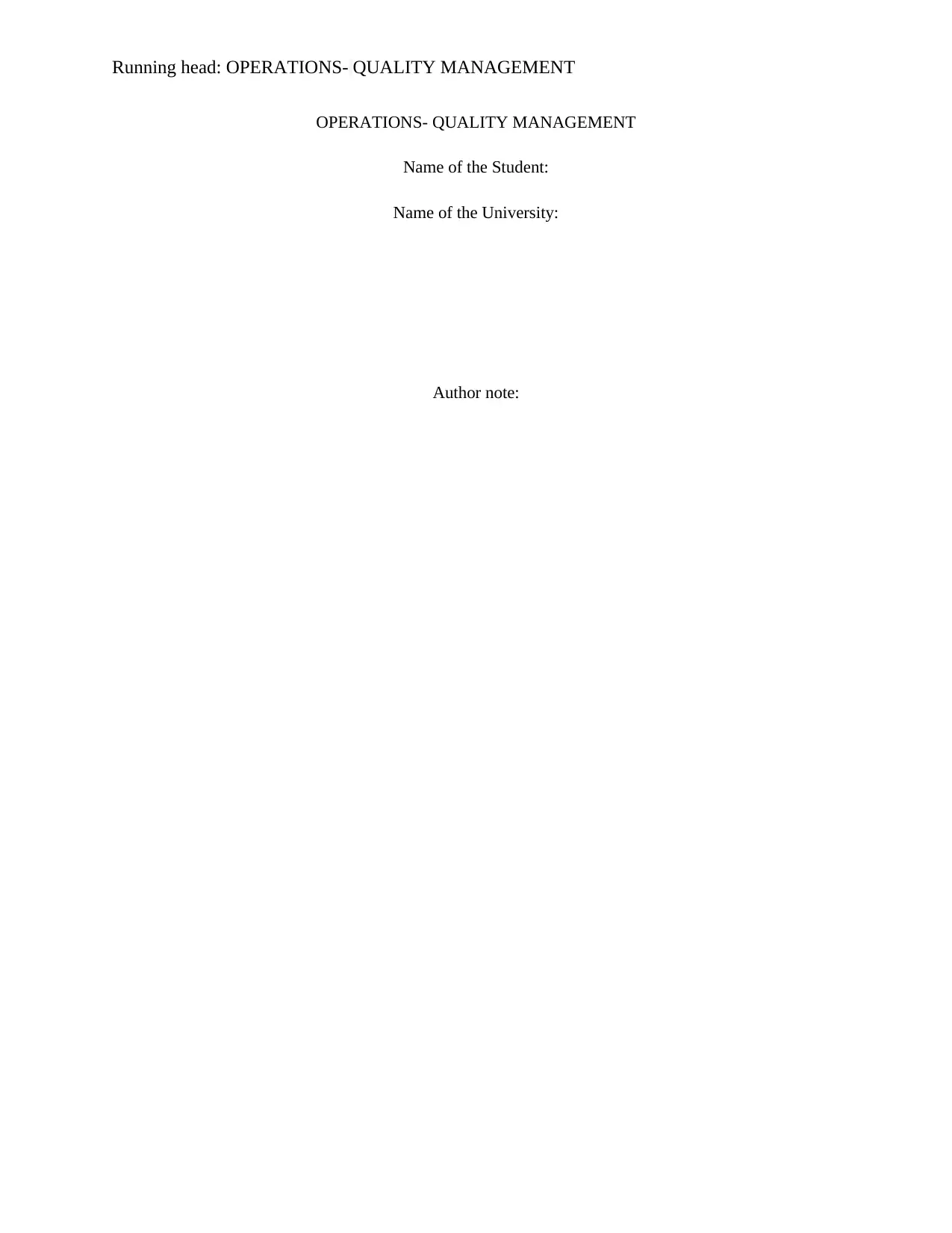
Running head: OPERATIONS- QUALITY MANAGEMENT
OPERATIONS- QUALITY MANAGEMENT
Name of the Student:
Name of the University:
Author note:
OPERATIONS- QUALITY MANAGEMENT
Name of the Student:
Name of the University:
Author note:
Paraphrase This Document
Need a fresh take? Get an instant paraphrase of this document with our AI Paraphraser
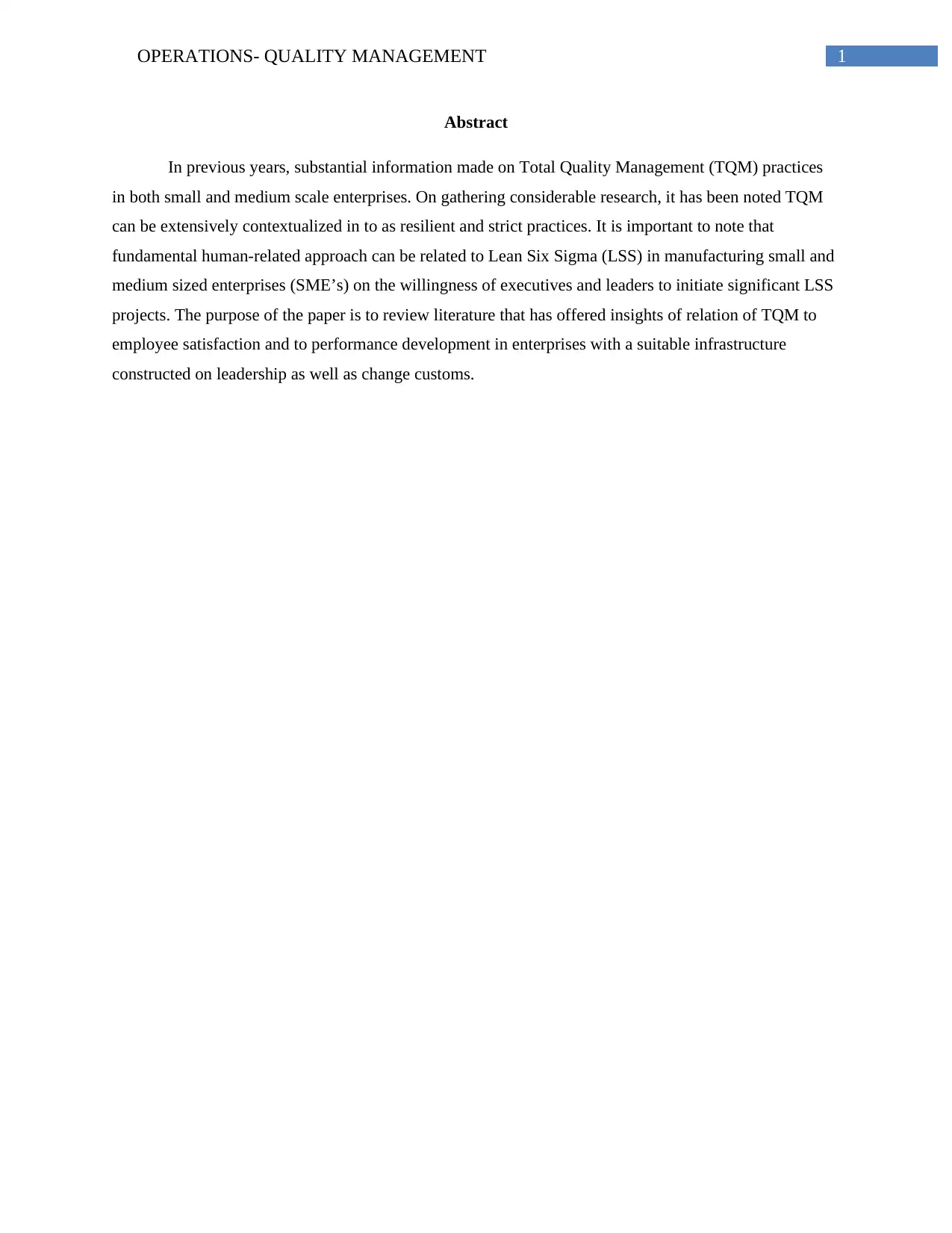
1OPERATIONS- QUALITY MANAGEMENT
Abstract
In previous years, substantial information made on Total Quality Management (TQM) practices
in both small and medium scale enterprises. On gathering considerable research, it has been noted TQM
can be extensively contextualized in to as resilient and strict practices. It is important to note that
fundamental human-related approach can be related to Lean Six Sigma (LSS) in manufacturing small and
medium sized enterprises (SME’s) on the willingness of executives and leaders to initiate significant LSS
projects. The purpose of the paper is to review literature that has offered insights of relation of TQM to
employee satisfaction and to performance development in enterprises with a suitable infrastructure
constructed on leadership as well as change customs.
Abstract
In previous years, substantial information made on Total Quality Management (TQM) practices
in both small and medium scale enterprises. On gathering considerable research, it has been noted TQM
can be extensively contextualized in to as resilient and strict practices. It is important to note that
fundamental human-related approach can be related to Lean Six Sigma (LSS) in manufacturing small and
medium sized enterprises (SME’s) on the willingness of executives and leaders to initiate significant LSS
projects. The purpose of the paper is to review literature that has offered insights of relation of TQM to
employee satisfaction and to performance development in enterprises with a suitable infrastructure
constructed on leadership as well as change customs.
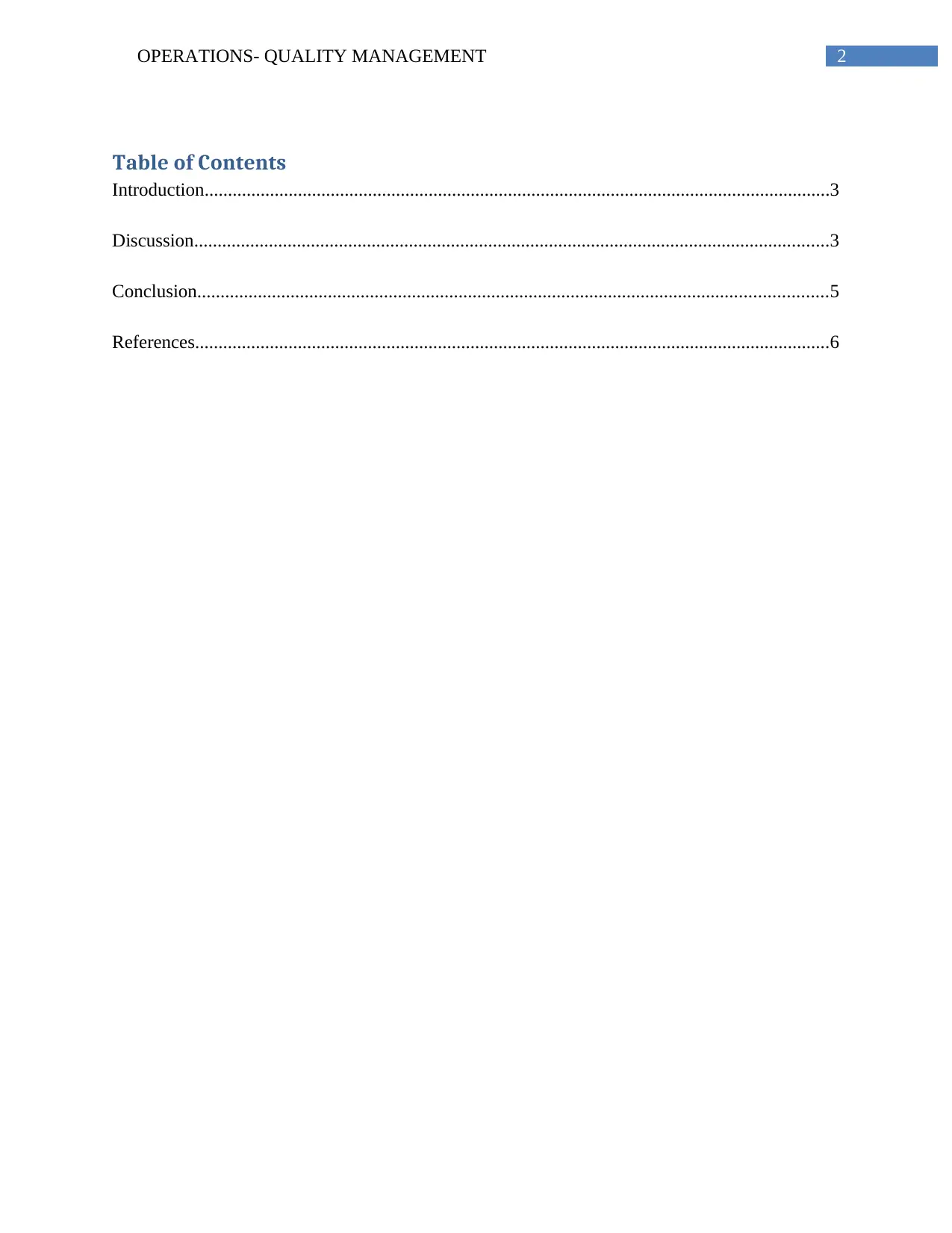
2OPERATIONS- QUALITY MANAGEMENT
Table of Contents
Introduction......................................................................................................................................3
Discussion........................................................................................................................................3
Conclusion.......................................................................................................................................5
References........................................................................................................................................6
Table of Contents
Introduction......................................................................................................................................3
Discussion........................................................................................................................................3
Conclusion.......................................................................................................................................5
References........................................................................................................................................6
⊘ This is a preview!⊘
Do you want full access?
Subscribe today to unlock all pages.

Trusted by 1+ million students worldwide
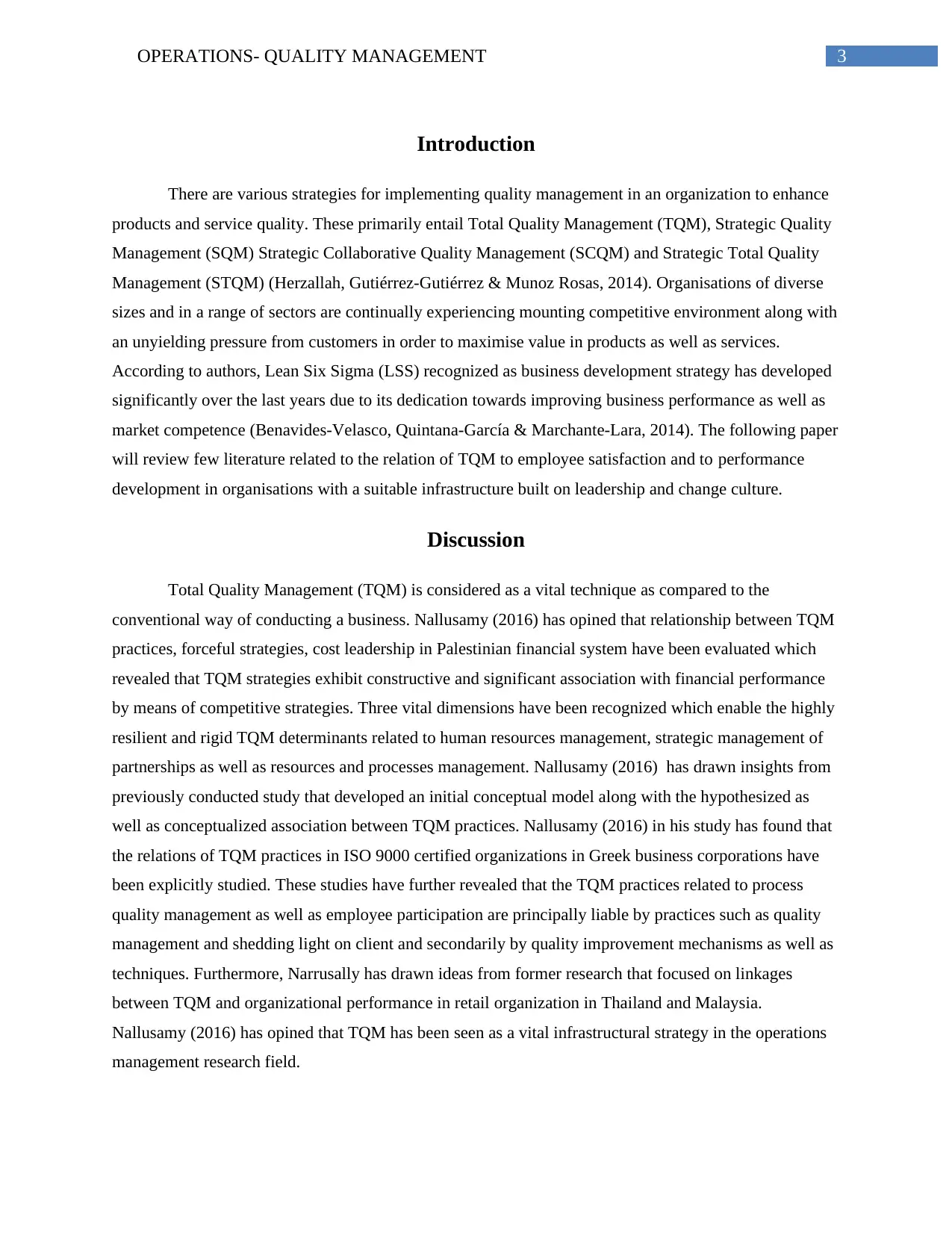
3OPERATIONS- QUALITY MANAGEMENT
Introduction
There are various strategies for implementing quality management in an organization to enhance
products and service quality. These primarily entail Total Quality Management (TQM), Strategic Quality
Management (SQM) Strategic Collaborative Quality Management (SCQM) and Strategic Total Quality
Management (STQM) (Herzallah, Gutiérrez-Gutiérrez & Munoz Rosas, 2014). Organisations of diverse
sizes and in a range of sectors are continually experiencing mounting competitive environment along with
an unyielding pressure from customers in order to maximise value in products as well as services.
According to authors, Lean Six Sigma (LSS) recognized as business development strategy has developed
significantly over the last years due to its dedication towards improving business performance as well as
market competence (Benavides-Velasco, Quintana-García & Marchante-Lara, 2014). The following paper
will review few literature related to the relation of TQM to employee satisfaction and to performance
development in organisations with a suitable infrastructure built on leadership and change culture.
Discussion
Total Quality Management (TQM) is considered as a vital technique as compared to the
conventional way of conducting a business. Nallusamy (2016) has opined that relationship between TQM
practices, forceful strategies, cost leadership in Palestinian financial system have been evaluated which
revealed that TQM strategies exhibit constructive and significant association with financial performance
by means of competitive strategies. Three vital dimensions have been recognized which enable the highly
resilient and rigid TQM determinants related to human resources management, strategic management of
partnerships as well as resources and processes management. Nallusamy (2016) has drawn insights from
previously conducted study that developed an initial conceptual model along with the hypothesized as
well as conceptualized association between TQM practices. Nallusamy (2016) in his study has found that
the relations of TQM practices in ISO 9000 certified organizations in Greek business corporations have
been explicitly studied. These studies have further revealed that the TQM practices related to process
quality management as well as employee participation are principally liable by practices such as quality
management and shedding light on client and secondarily by quality improvement mechanisms as well as
techniques. Furthermore, Narrusally has drawn ideas from former research that focused on linkages
between TQM and organizational performance in retail organization in Thailand and Malaysia.
Nallusamy (2016) has opined that TQM has been seen as a vital infrastructural strategy in the operations
management research field.
Introduction
There are various strategies for implementing quality management in an organization to enhance
products and service quality. These primarily entail Total Quality Management (TQM), Strategic Quality
Management (SQM) Strategic Collaborative Quality Management (SCQM) and Strategic Total Quality
Management (STQM) (Herzallah, Gutiérrez-Gutiérrez & Munoz Rosas, 2014). Organisations of diverse
sizes and in a range of sectors are continually experiencing mounting competitive environment along with
an unyielding pressure from customers in order to maximise value in products as well as services.
According to authors, Lean Six Sigma (LSS) recognized as business development strategy has developed
significantly over the last years due to its dedication towards improving business performance as well as
market competence (Benavides-Velasco, Quintana-García & Marchante-Lara, 2014). The following paper
will review few literature related to the relation of TQM to employee satisfaction and to performance
development in organisations with a suitable infrastructure built on leadership and change culture.
Discussion
Total Quality Management (TQM) is considered as a vital technique as compared to the
conventional way of conducting a business. Nallusamy (2016) has opined that relationship between TQM
practices, forceful strategies, cost leadership in Palestinian financial system have been evaluated which
revealed that TQM strategies exhibit constructive and significant association with financial performance
by means of competitive strategies. Three vital dimensions have been recognized which enable the highly
resilient and rigid TQM determinants related to human resources management, strategic management of
partnerships as well as resources and processes management. Nallusamy (2016) has drawn insights from
previously conducted study that developed an initial conceptual model along with the hypothesized as
well as conceptualized association between TQM practices. Nallusamy (2016) in his study has found that
the relations of TQM practices in ISO 9000 certified organizations in Greek business corporations have
been explicitly studied. These studies have further revealed that the TQM practices related to process
quality management as well as employee participation are principally liable by practices such as quality
management and shedding light on client and secondarily by quality improvement mechanisms as well as
techniques. Furthermore, Narrusally has drawn ideas from former research that focused on linkages
between TQM and organizational performance in retail organization in Thailand and Malaysia.
Nallusamy (2016) has opined that TQM has been seen as a vital infrastructural strategy in the operations
management research field.
Paraphrase This Document
Need a fresh take? Get an instant paraphrase of this document with our AI Paraphraser
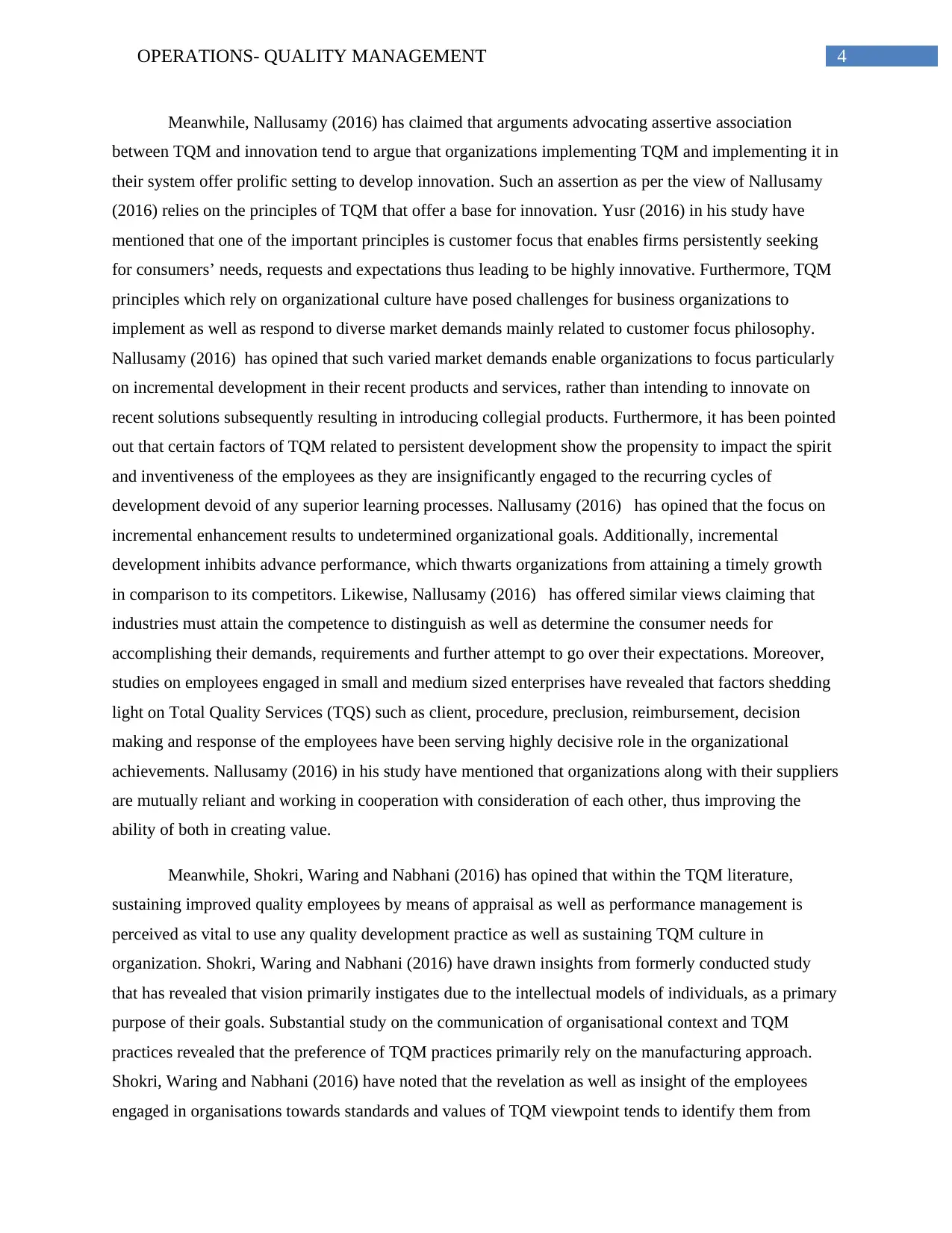
4OPERATIONS- QUALITY MANAGEMENT
Meanwhile, Nallusamy (2016) has claimed that arguments advocating assertive association
between TQM and innovation tend to argue that organizations implementing TQM and implementing it in
their system offer prolific setting to develop innovation. Such an assertion as per the view of Nallusamy
(2016) relies on the principles of TQM that offer a base for innovation. Yusr (2016) in his study have
mentioned that one of the important principles is customer focus that enables firms persistently seeking
for consumers’ needs, requests and expectations thus leading to be highly innovative. Furthermore, TQM
principles which rely on organizational culture have posed challenges for business organizations to
implement as well as respond to diverse market demands mainly related to customer focus philosophy.
Nallusamy (2016) has opined that such varied market demands enable organizations to focus particularly
on incremental development in their recent products and services, rather than intending to innovate on
recent solutions subsequently resulting in introducing collegial products. Furthermore, it has been pointed
out that certain factors of TQM related to persistent development show the propensity to impact the spirit
and inventiveness of the employees as they are insignificantly engaged to the recurring cycles of
development devoid of any superior learning processes. Nallusamy (2016) has opined that the focus on
incremental enhancement results to undetermined organizational goals. Additionally, incremental
development inhibits advance performance, which thwarts organizations from attaining a timely growth
in comparison to its competitors. Likewise, Nallusamy (2016) has offered similar views claiming that
industries must attain the competence to distinguish as well as determine the consumer needs for
accomplishing their demands, requirements and further attempt to go over their expectations. Moreover,
studies on employees engaged in small and medium sized enterprises have revealed that factors shedding
light on Total Quality Services (TQS) such as client, procedure, preclusion, reimbursement, decision
making and response of the employees have been serving highly decisive role in the organizational
achievements. Nallusamy (2016) in his study have mentioned that organizations along with their suppliers
are mutually reliant and working in cooperation with consideration of each other, thus improving the
ability of both in creating value.
Meanwhile, Shokri, Waring and Nabhani (2016) has opined that within the TQM literature,
sustaining improved quality employees by means of appraisal as well as performance management is
perceived as vital to use any quality development practice as well as sustaining TQM culture in
organization. Shokri, Waring and Nabhani (2016) have drawn insights from formerly conducted study
that has revealed that vision primarily instigates due to the intellectual models of individuals, as a primary
purpose of their goals. Substantial study on the communication of organisational context and TQM
practices revealed that the preference of TQM practices primarily rely on the manufacturing approach.
Shokri, Waring and Nabhani (2016) have noted that the revelation as well as insight of the employees
engaged in organisations towards standards and values of TQM viewpoint tends to identify them from
Meanwhile, Nallusamy (2016) has claimed that arguments advocating assertive association
between TQM and innovation tend to argue that organizations implementing TQM and implementing it in
their system offer prolific setting to develop innovation. Such an assertion as per the view of Nallusamy
(2016) relies on the principles of TQM that offer a base for innovation. Yusr (2016) in his study have
mentioned that one of the important principles is customer focus that enables firms persistently seeking
for consumers’ needs, requests and expectations thus leading to be highly innovative. Furthermore, TQM
principles which rely on organizational culture have posed challenges for business organizations to
implement as well as respond to diverse market demands mainly related to customer focus philosophy.
Nallusamy (2016) has opined that such varied market demands enable organizations to focus particularly
on incremental development in their recent products and services, rather than intending to innovate on
recent solutions subsequently resulting in introducing collegial products. Furthermore, it has been pointed
out that certain factors of TQM related to persistent development show the propensity to impact the spirit
and inventiveness of the employees as they are insignificantly engaged to the recurring cycles of
development devoid of any superior learning processes. Nallusamy (2016) has opined that the focus on
incremental enhancement results to undetermined organizational goals. Additionally, incremental
development inhibits advance performance, which thwarts organizations from attaining a timely growth
in comparison to its competitors. Likewise, Nallusamy (2016) has offered similar views claiming that
industries must attain the competence to distinguish as well as determine the consumer needs for
accomplishing their demands, requirements and further attempt to go over their expectations. Moreover,
studies on employees engaged in small and medium sized enterprises have revealed that factors shedding
light on Total Quality Services (TQS) such as client, procedure, preclusion, reimbursement, decision
making and response of the employees have been serving highly decisive role in the organizational
achievements. Nallusamy (2016) in his study have mentioned that organizations along with their suppliers
are mutually reliant and working in cooperation with consideration of each other, thus improving the
ability of both in creating value.
Meanwhile, Shokri, Waring and Nabhani (2016) has opined that within the TQM literature,
sustaining improved quality employees by means of appraisal as well as performance management is
perceived as vital to use any quality development practice as well as sustaining TQM culture in
organization. Shokri, Waring and Nabhani (2016) have drawn insights from formerly conducted study
that has revealed that vision primarily instigates due to the intellectual models of individuals, as a primary
purpose of their goals. Substantial study on the communication of organisational context and TQM
practices revealed that the preference of TQM practices primarily rely on the manufacturing approach.
Shokri, Waring and Nabhani (2016) have noted that the revelation as well as insight of the employees
engaged in organisations towards standards and values of TQM viewpoint tends to identify them from
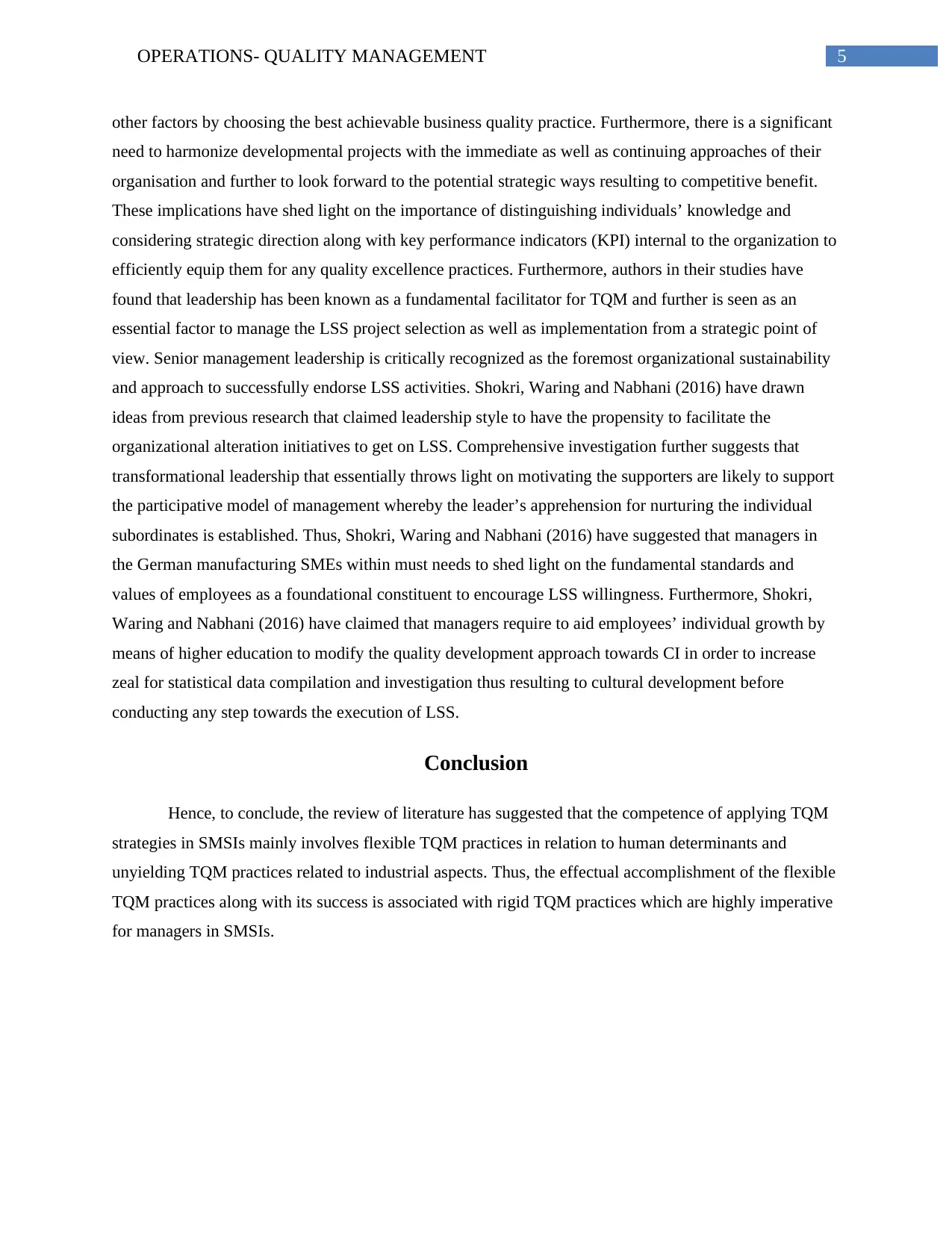
5OPERATIONS- QUALITY MANAGEMENT
other factors by choosing the best achievable business quality practice. Furthermore, there is a significant
need to harmonize developmental projects with the immediate as well as continuing approaches of their
organisation and further to look forward to the potential strategic ways resulting to competitive benefit.
These implications have shed light on the importance of distinguishing individuals’ knowledge and
considering strategic direction along with key performance indicators (KPI) internal to the organization to
efficiently equip them for any quality excellence practices. Furthermore, authors in their studies have
found that leadership has been known as a fundamental facilitator for TQM and further is seen as an
essential factor to manage the LSS project selection as well as implementation from a strategic point of
view. Senior management leadership is critically recognized as the foremost organizational sustainability
and approach to successfully endorse LSS activities. Shokri, Waring and Nabhani (2016) have drawn
ideas from previous research that claimed leadership style to have the propensity to facilitate the
organizational alteration initiatives to get on LSS. Comprehensive investigation further suggests that
transformational leadership that essentially throws light on motivating the supporters are likely to support
the participative model of management whereby the leader’s apprehension for nurturing the individual
subordinates is established. Thus, Shokri, Waring and Nabhani (2016) have suggested that managers in
the German manufacturing SMEs within must needs to shed light on the fundamental standards and
values of employees as a foundational constituent to encourage LSS willingness. Furthermore, Shokri,
Waring and Nabhani (2016) have claimed that managers require to aid employees’ individual growth by
means of higher education to modify the quality development approach towards CI in order to increase
zeal for statistical data compilation and investigation thus resulting to cultural development before
conducting any step towards the execution of LSS.
Conclusion
Hence, to conclude, the review of literature has suggested that the competence of applying TQM
strategies in SMSIs mainly involves flexible TQM practices in relation to human determinants and
unyielding TQM practices related to industrial aspects. Thus, the effectual accomplishment of the flexible
TQM practices along with its success is associated with rigid TQM practices which are highly imperative
for managers in SMSIs.
other factors by choosing the best achievable business quality practice. Furthermore, there is a significant
need to harmonize developmental projects with the immediate as well as continuing approaches of their
organisation and further to look forward to the potential strategic ways resulting to competitive benefit.
These implications have shed light on the importance of distinguishing individuals’ knowledge and
considering strategic direction along with key performance indicators (KPI) internal to the organization to
efficiently equip them for any quality excellence practices. Furthermore, authors in their studies have
found that leadership has been known as a fundamental facilitator for TQM and further is seen as an
essential factor to manage the LSS project selection as well as implementation from a strategic point of
view. Senior management leadership is critically recognized as the foremost organizational sustainability
and approach to successfully endorse LSS activities. Shokri, Waring and Nabhani (2016) have drawn
ideas from previous research that claimed leadership style to have the propensity to facilitate the
organizational alteration initiatives to get on LSS. Comprehensive investigation further suggests that
transformational leadership that essentially throws light on motivating the supporters are likely to support
the participative model of management whereby the leader’s apprehension for nurturing the individual
subordinates is established. Thus, Shokri, Waring and Nabhani (2016) have suggested that managers in
the German manufacturing SMEs within must needs to shed light on the fundamental standards and
values of employees as a foundational constituent to encourage LSS willingness. Furthermore, Shokri,
Waring and Nabhani (2016) have claimed that managers require to aid employees’ individual growth by
means of higher education to modify the quality development approach towards CI in order to increase
zeal for statistical data compilation and investigation thus resulting to cultural development before
conducting any step towards the execution of LSS.
Conclusion
Hence, to conclude, the review of literature has suggested that the competence of applying TQM
strategies in SMSIs mainly involves flexible TQM practices in relation to human determinants and
unyielding TQM practices related to industrial aspects. Thus, the effectual accomplishment of the flexible
TQM practices along with its success is associated with rigid TQM practices which are highly imperative
for managers in SMSIs.
⊘ This is a preview!⊘
Do you want full access?
Subscribe today to unlock all pages.

Trusted by 1+ million students worldwide
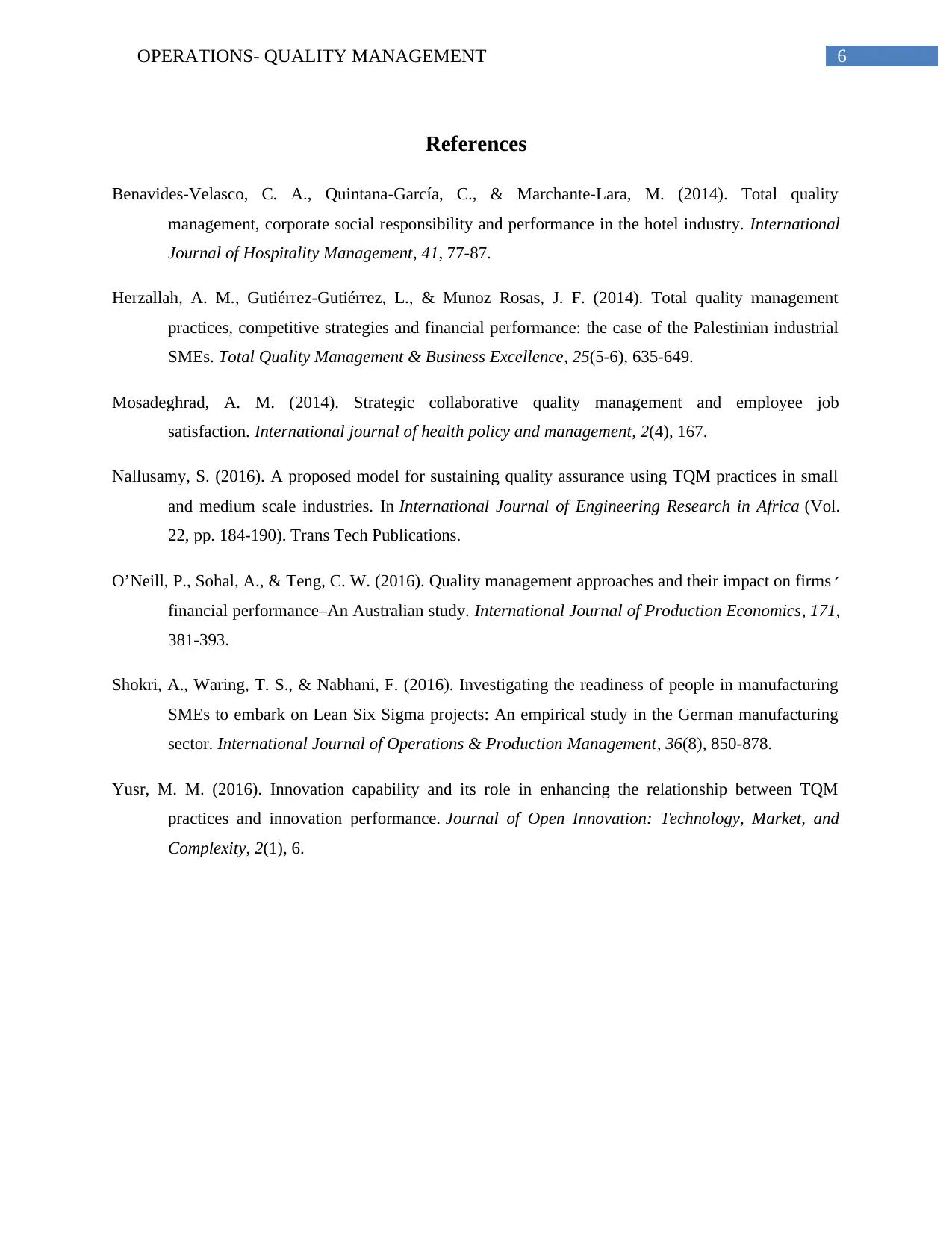
6OPERATIONS- QUALITY MANAGEMENT
References
Benavides-Velasco, C. A., Quintana-García, C., & Marchante-Lara, M. (2014). Total quality
management, corporate social responsibility and performance in the hotel industry. International
Journal of Hospitality Management, 41, 77-87.
Herzallah, A. M., Gutiérrez-Gutiérrez, L., & Munoz Rosas, J. F. (2014). Total quality management
practices, competitive strategies and financial performance: the case of the Palestinian industrial
SMEs. Total Quality Management & Business Excellence, 25(5-6), 635-649.
Mosadeghrad, A. M. (2014). Strategic collaborative quality management and employee job
satisfaction. International journal of health policy and management, 2(4), 167.
Nallusamy, S. (2016). A proposed model for sustaining quality assurance using TQM practices in small
and medium scale industries. In International Journal of Engineering Research in Africa (Vol.
22, pp. 184-190). Trans Tech Publications.
O’Neill, P., Sohal, A., & Teng, C. W. (2016). Quality management approaches and their impact on firms ׳
financial performance–An Australian study. International Journal of Production Economics, 171,
381-393.
Shokri, A., Waring, T. S., & Nabhani, F. (2016). Investigating the readiness of people in manufacturing
SMEs to embark on Lean Six Sigma projects: An empirical study in the German manufacturing
sector. International Journal of Operations & Production Management, 36(8), 850-878.
Yusr, M. M. (2016). Innovation capability and its role in enhancing the relationship between TQM
practices and innovation performance. Journal of Open Innovation: Technology, Market, and
Complexity, 2(1), 6.
References
Benavides-Velasco, C. A., Quintana-García, C., & Marchante-Lara, M. (2014). Total quality
management, corporate social responsibility and performance in the hotel industry. International
Journal of Hospitality Management, 41, 77-87.
Herzallah, A. M., Gutiérrez-Gutiérrez, L., & Munoz Rosas, J. F. (2014). Total quality management
practices, competitive strategies and financial performance: the case of the Palestinian industrial
SMEs. Total Quality Management & Business Excellence, 25(5-6), 635-649.
Mosadeghrad, A. M. (2014). Strategic collaborative quality management and employee job
satisfaction. International journal of health policy and management, 2(4), 167.
Nallusamy, S. (2016). A proposed model for sustaining quality assurance using TQM practices in small
and medium scale industries. In International Journal of Engineering Research in Africa (Vol.
22, pp. 184-190). Trans Tech Publications.
O’Neill, P., Sohal, A., & Teng, C. W. (2016). Quality management approaches and their impact on firms ׳
financial performance–An Australian study. International Journal of Production Economics, 171,
381-393.
Shokri, A., Waring, T. S., & Nabhani, F. (2016). Investigating the readiness of people in manufacturing
SMEs to embark on Lean Six Sigma projects: An empirical study in the German manufacturing
sector. International Journal of Operations & Production Management, 36(8), 850-878.
Yusr, M. M. (2016). Innovation capability and its role in enhancing the relationship between TQM
practices and innovation performance. Journal of Open Innovation: Technology, Market, and
Complexity, 2(1), 6.
1 out of 7
Related Documents
Your All-in-One AI-Powered Toolkit for Academic Success.
+13062052269
info@desklib.com
Available 24*7 on WhatsApp / Email
![[object Object]](/_next/static/media/star-bottom.7253800d.svg)
Unlock your academic potential
Copyright © 2020–2026 A2Z Services. All Rights Reserved. Developed and managed by ZUCOL.




